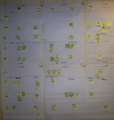Open Spaces Unconferences
Learning from each other 2013:Open Spaces Learning If you intend to attend in person, it is important to understand what type of event this is: an open spaces unconference.
In essence, the event will be as great as we make it.
- Whoever shows up are the right people
- Whatever happens is the only thing that could have
- Whenever it starts is the right time
- When it's over, it's over.
Be prepared to be surprised! :-)
Engage with the process. We can practice asynchronously on this wiki as a pre-event activity.
Pre-event Open Spaces Wiki
- How to get started is described on our Iced Tea in Crete home page on WikiEducator.
- Propose a topic and generate some discussion.
Some topics may be sufficiently similar to merge, or become unwieldy and be split (discuss and then edit the topics page).
Whoever posted the topic is the "convener" who might like to lead the discussion, though groups may self-organise and optionally assign various roles (e.g. scribe, rapporteur, ...) during the actual event.
The topics page will be a useful reminder of what people thought of doing in Crete in advance. What we actually do will unfold during the event in Crete, driven by those present, and may be completely different.
The 2011 topics page is illustrative.
What we actually did in 2011 is shown in the 2011 "Space-time Matrix".
The topics page will give us some idea of the what the participants are likely to propose when we get started for real at the event.
During the Event
During the event, everything may change as we repeat the process face-to-face, perhaps with postits, white boards and flipcharts. Proposed topics from the wiki might re-emerge but expect new ideas as the collective creative energy flows.
Participants are invited to propose topics on post-its <title, name of proposer> which first go onto a "launchpad" for initial clustering and then organised onto the schedule (or "space-time matrix"). By proposing a topic you are also volunteering to convene the session and ensure that any required outputs are produced. So, only propose a topic if you are willing to take responsibility for it (e.g. you are an expert or you passionately want to learn about that topic).
Attracting participants to your topic can be a challenge. One approach is to have each proposer do a 2 minute pitch for their topic to attract participants. We could also do "speed geeking" for the same purpose, or a simple sign-up approach with hands/feet.
Speaking of feet, Open Spaces has one "law":
The Law of Two Feet:
"If at any time you find yourself in any situation where you are neither learning nor contributing: use your two feet and go someplace else".
i.e. don't waste time, move around, cross-pollinate groups, and be open to chance encounters which often bring out the most creative of discussions.
If you want to go to two discussions in the same time slot, try negotiating a change to the schedule (preferably while that part of the schedule is being composed).
The schedule (or "space-time matrix") may include an opportunity for people to report back on their discussions (propose/request a report-back if desired).
ConCrete Outputs?
Open spaces are open spaces with no pre-set agendas, tracks, outputs or outcomes. The participants self-organise and
- take responsibility to raise issues of concern
- discuss issues to the full extent desired
- produce reports (on-the-fly - right here on WikiEducator - linked from the space-time matrix)
- feel free to record (photo, audio, video) and post to or link from this wiki, blog, tweet, etc.
- all contributions to this wiki are to be licensed according to the WikiEducator copyright policy.
- Note that you can also upload to Wikimedia Commons and reference the media files on WikiEducator by name (see for example this tutorial for images).
- all contributions to this wiki are to be licensed according to the WikiEducator copyright policy.
- the responsibility for writing these reports rests with each group, starting with the convenor (the person who proposed the topic).
- feel free to record (photo, audio, video) and post to or link from this wiki, blog, tweet, etc.
- and, where applicable and desired, create spaces for setting priorities and developing post-event action plans.
Further Information
For more background see the following and associated links:
- Wikipedia on Open Space Technology.
- Owen, Harrison (2008). Open Space Technology: A User's Guide (3rd ed.). Berrett-Koehler. ISBN 978-1576754764.
- Some great videos and other resources may be found on the web.


